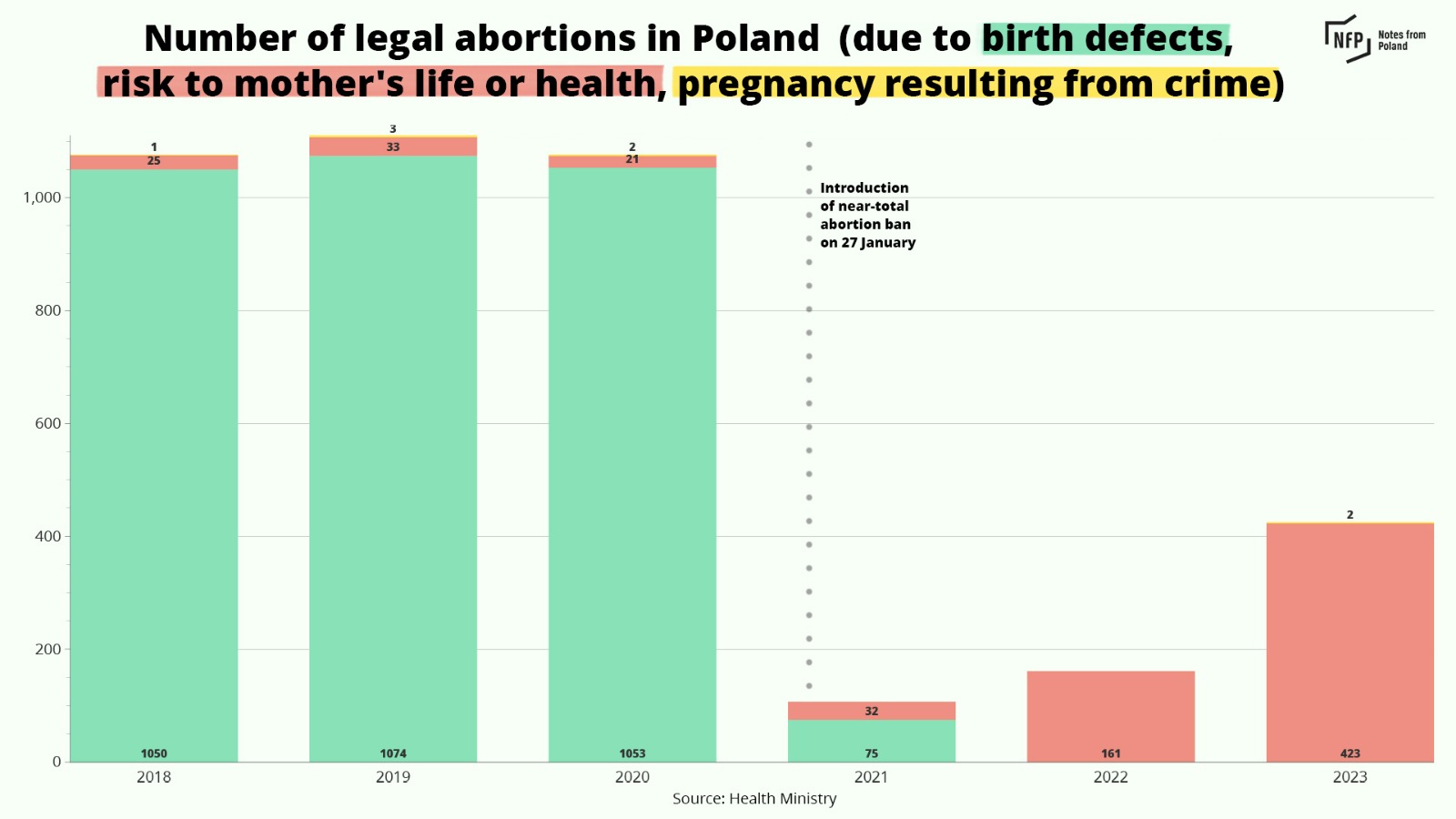Only 425 legal abortions were carried out in Poland in 2023 – the second full year in which a near-total abortion ban was in force – newly released official data show.
That is less than half the number recorded in 2020, the last year before the ban went into force. However, it was significantly higher than in 2021 and 2022.
Abortion activists say this is likely to be because doctors are starting to more broadly interpret what constitutes a threat to the mother’s life or health, which since 2021 is one of only two legal grounds for terminating a pregnancy in Poland.

“This may be a signal that doctors are slowly beginning to interpret more broadly the grounds relating to the risk to the health or life of a pregnant person,” wrote activist group Legalna Aborcja, which obtained the 2023 data from the health ministry.
“It is just a pity that several people had to die first before abortions were finally started at least in those extreme cases provided for by the law,” they added.
Several pregnant women have died in hospitals in recent years, in some cases after doctors refused to carry out abortions.
Thousands joined protests against Poland’s near-total abortion ban yesterday following the latest death of a pregnant woman in hospital.
But the conservative authorities say the tragedy was caused by medical malpractice, not the abortion law https://t.co/dJFJn6O1Y4
— Notes from Poland 🇵🇱 (@notesfrompoland) June 15, 2023
Until 2020, abortion in Poland was legal in three cases: when pregnancy threatened the life or health of the mother, when it resulted from a criminal act (such as rape or incest), or when a severe birth defect was diagnosed in the foetus.
However, in November 2020, the constitutional court outlawed the third of those grounds, which had previously constituted around 97% of legal abortions. That ruling went into force in late January 2021.
While 2020 had seen legal 1,076 abortions, that figure fell to just 107 the following year (with the majority of those taking place before the ruling went into force on 27 January).
However, the health ministry’s data show that since then, there has been a steady rise in the number of legal abortions, almost all of which are justified on the grounds of a threat to the mother’s life or health.
Sorry to interrupt your reading. The article continues below.

Notes from Poland is run by a small editorial team and published by an independent, non-profit foundation that is funded through donations from our readers. We cannot do what we do without your support.
Last year, both Poland’s Supreme Medical Chamber and the health ministry issued guidelines on when doctors can legally perform abortions in cases of a threat to life or health. Those were published in response to anger over the deaths of pregnant women in hospitals.
Abortion activist groups also note that, while still only a few hundred legal abortions take place in Poland annually, thousands more happen off the books.
One such group, Federa, estimates that between 80,000 and 200,000 abortions are performed annually by Polish women (by taking abortion pills or through procedures in foreign clinics), reports the Polish Press Agency (PAP). The true figure, by its nature, is difficult to establish.
Legalna Aborcja notes that the activist network Abortion Without Borders helps Polish women obtain “more abortions in four days than the Polish state does in a year”.
Illegal abortions in backstreet clinics are a thing of the past. Instead, activists in Poland now help women obtain abortion pills
Conservatives are calling for the law to be toughened to prevent and punish the distribution of such pills, writes @AnnaZabl https://t.co/QahNRd6zPe
— Notes from Poland 🇵🇱 (@notesfrompoland) June 13, 2022
Poland’s new government that took office in December has pledged to liberalise the abortion law. But progress on that front has been slow due to disagreements between members of the ruling coalition, which ranges from the left to centre right.
Two weeks ago, the parliament rejected a bill that would have decriminalised the act of helping a woman obtain an unlawful abortion after the most conservative group in the ruling coalition, the Polish People’s Party (PSL), joined the opposition to vote against it.
Parliament is also currently considering three bills aimed at ending the near-total abortion ban: two that would introduce abortion on demand and one that would return to the pre-2021 abortion law. However, it may be difficult to obtain a majority in favour of any of the bills.
Parliament has rejected a bill that would have softened Poland's abortion laws after the most conservative party in Donald Tusk's ruling coalition joined the right-wing opposition in voting against it https://t.co/pJplnHhtZn
— Notes from Poland 🇵🇱 (@notesfrompoland) July 12, 2024
Main image credit: Pavel Danilyuk/Pexels

Alicja Ptak is deputy editor-in-chief of Notes from Poland and a multimedia journalist. She has written for Clean Energy Wire and The Times, and she hosts her own podcast, The Warsaw Wire, on Poland’s economy and energy sector. She previously worked for Reuters.



















